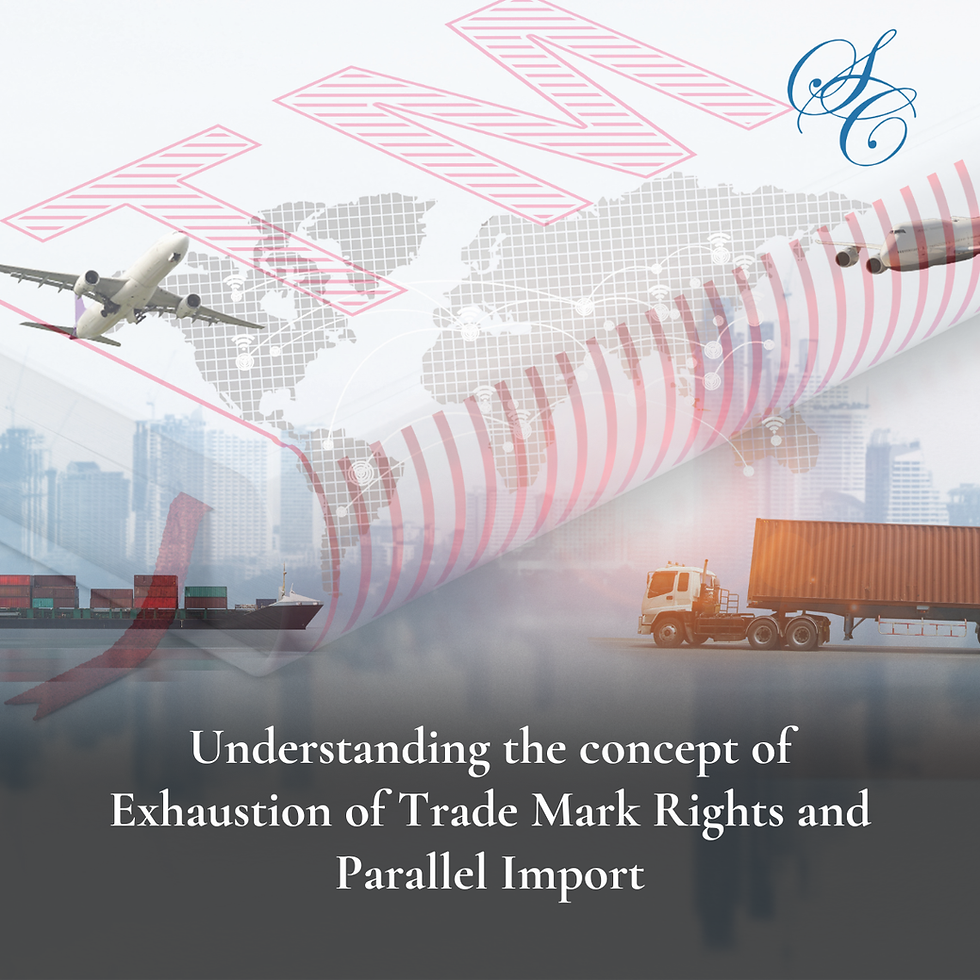Magical Combat Of Noodles
- Sarwajeet Singh
- Jul 13, 2020
- 4 min read
Our Associate, Anand Kumar discusses “Magical Combat Of Noodles”
Recently, in ITC Limited vs Nestle India Limited (C.S.No.231 of 2013), the Madras High Court denied a permanent injunction to ITC Limited (“Plaintiff”). In this case, the Plaintiff sought to restrain Nestle India Limited (“Defendant”) from using the mark MAGICAL MASALA in respect of noodles. The Plaintiff alleged that MAGICAL MASALA is similar to its mark MAGIC MASALA that is also used on and in relation to noodles.
The Defendant contented that the mark MAGIC MASALA is a descriptive and/or laudatory mark in respect of noodles. In the absence of secondary significance, the Plaintiff cannot claim exclusive common law rights in the mark for the purpose of a passing-off action. Also, MAGIC MASALA was contended to common to trade and, therefore, the Plaintiff cannot monopolise the terms ‘MAGIC’ and ‘MASALA’ and restrain others from using these terms.
The court observed that there are two broad categories of marks, one, which are inherently distinctive and capable of being protected and others which acquire distinctiveness through secondary meaning. The court also referred to McCarthy on Trademarks and Unfair Competition, 3rd Edition that provides the complete spectrum of distinctiveness of marks arrayed in an ascending order roughly reflecting their eligibility to function as trademarks and the degree of protection afforded to them viz. generic, descriptive, suggestive, arbitrary and fanciful. Further, the court observed that the thumb rule is that words or expressions which are not distinctive are inherently weak and are, therefore, incapable of being registered or protected. However, the court also clarified and re-emphasised settled law that such weak marks may also become distinctive on account of their long and uninterrupted use over a period of time, as a result of which they may get a secondary meaning and the consumer may begin to associate them with the goods of a single proprietor.
In the instant case, the court observed that the Plaintiff has been using the word MAGIC to name the flavour in a sachet as Magic. While concurring with the view presented by the Plaintiff that there is no flavour known to the world which is called magic, the court observed that the use of the mark MAGIC MASALA in respect of a sachet of masala is not descriptive.
However, at the same time, the court also took note of the fact that Plaintiff has used the expression MAGIC MASALA in a laudatory manner to praise the “masala” in a sachet. It is settled law that a laudatory epithet cannot be given monopoly or protection. Being so, the court observed that the word MAGIC is a laudatory word which cannot be monopolised.
As regards the expression MAGIC MASALA being common to trade, the court noted that goods bearing the mark MAGIC are not merely subsisting on the records of the Trade Marks Registry, but MAGIC is commonly used in the food and cosmetic industry cutting across different segments of goods. Also, the court observed that the expression “Masala” signifies a mixture of ground spices used in Indian cooking and, therefore, it is a generic word for a mix of different spices. Consequently, none of these expressions be monopolized and appropriated in favor of the Plaintiff in exclusion of others, including, Defendants.
Given the aforesaid findings, the court concluded that even though there is a phonetic similarity between the word “Magic” used by the Plaintiff and the word “Magical” used by the Defendant, nonetheless they are incapable of being monopolised as they are not only laudatory but also common to the trade.
As regards the common law remedy of passing-off claimed by Plaintiff as an unregistered proprietor of the trade mark MAGIC MASALA, the court emphasised that the Plaintiff must pass the trinity-test laid down by Hon’ble Apex court. The test requires the Plaintiff to clearly establish before the court that it enjoys the goodwill in the mark, the use of the mark by the Defendants amounts to misrepresentation and, consequently, such misrepresentation causes damage to the Plaintiff’s business.
The court held that on comparing the wrappers (shown below) and/or trade dress of the rival goods of the Plaintiff and Defendant, there is no visual or ocular similarity. This is because of the difference in the overall colour scheme (red and yellow colors v. red, yellow and green colors), layout, style and the get-up of the two wrappers of the rival goods. Also, the trade mark SUNFEAST YIPEE! is written on the Plaintiff’s packaging, whereas the Defendant’s packaging has the mark MAGGI.
Defendant’s Packaging
Plaintiff’s Packaging


Also, under the law there is no scope to dissect the Plaintiff’s MAGIC MASALA label to conclude that the Defendant has copied the Plaintiff’s sub-brand MAGIC MASALA as it was never conceived as brand or trademark by the Plaintiff. Therefore, it cannot be said that there is a misrepresentation by the Defendant.
Finally, considering the overall colour scheme, layout, style and the get-up of the wrappers of the rival goods and composite marks, the court held that there is no scope to infer passing-off. Accordingly, the Plaintiff is not entitled to relief.
Citation: ITC Limited vs Nestle India Limited (C.S.No.231 of 2013), decision dt. June 10, 2020 by Madras High Court.




Comments